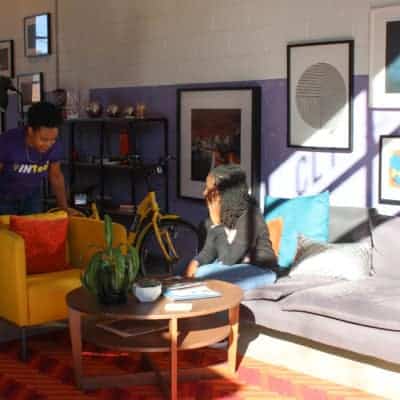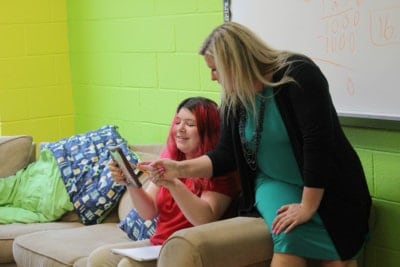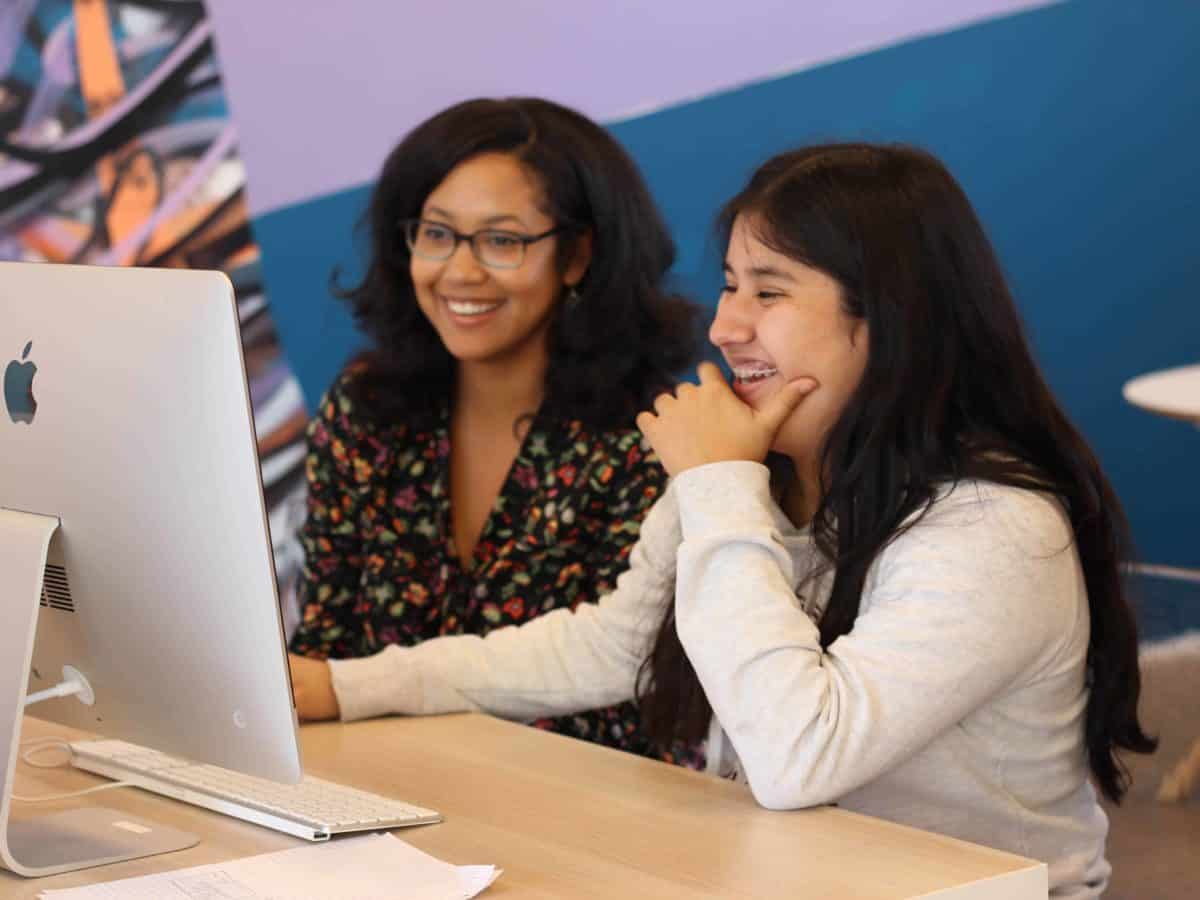

Tucked into a renovated warehouse, there’s a colorful high-tech room with a giant glass garage door open to the sidewalk to let in fresh air and lots of natural light — almost as if what happens inside is too big for closed walls. Indoors, framed artwork adorns the place, geometric shapes permeate the room, and succulents sit on shelves.
This forward-thinking space could just as easily be in California, but it’s in Charlotte.
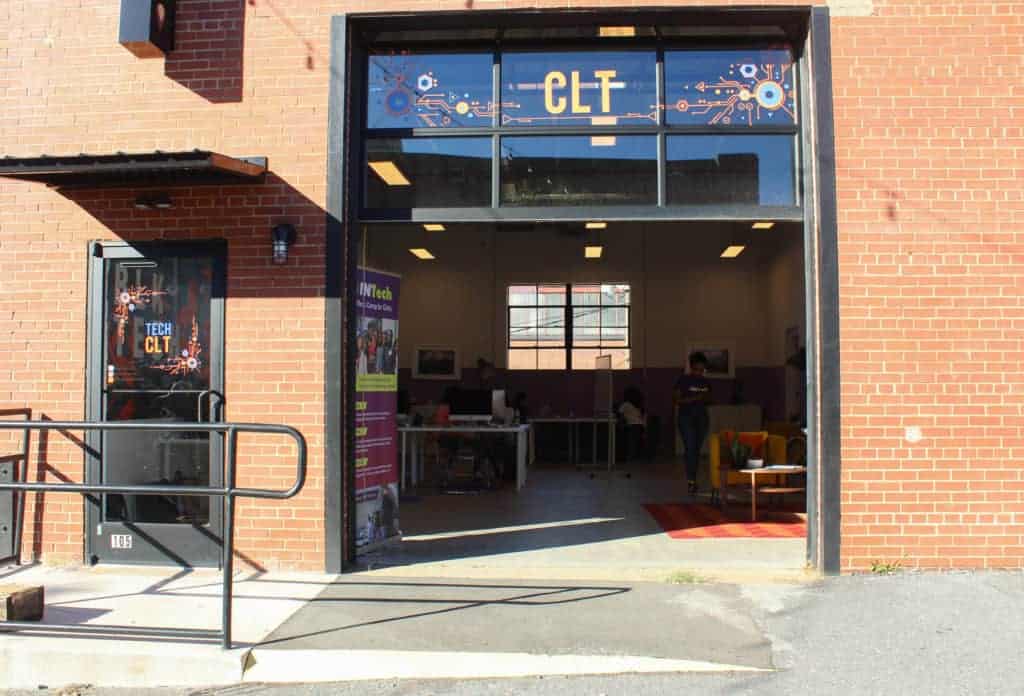

To reinforce that there’s something special happening here, when I arrived last Thursday at BLKTECHCLT, there was already an NBC News crew from Atlanta conducting interviews. But our story wasn’t about a hip co-working location. We were there to see the INTech Camp for Girls, which has reached over 500 minority girls in North and South Carolina through its tech camps.
Founder Khalia Braswell moved from phone call to laptop to looking over the shoulder of two “scholars” who were wrapping up their third and final week of camp. The high school students have been working together on developing a game app, using a curriculum through Facebook called Engineer for the Week. The current scholar duo is one Latina and one black girl.
This is how INTech brings color to code.
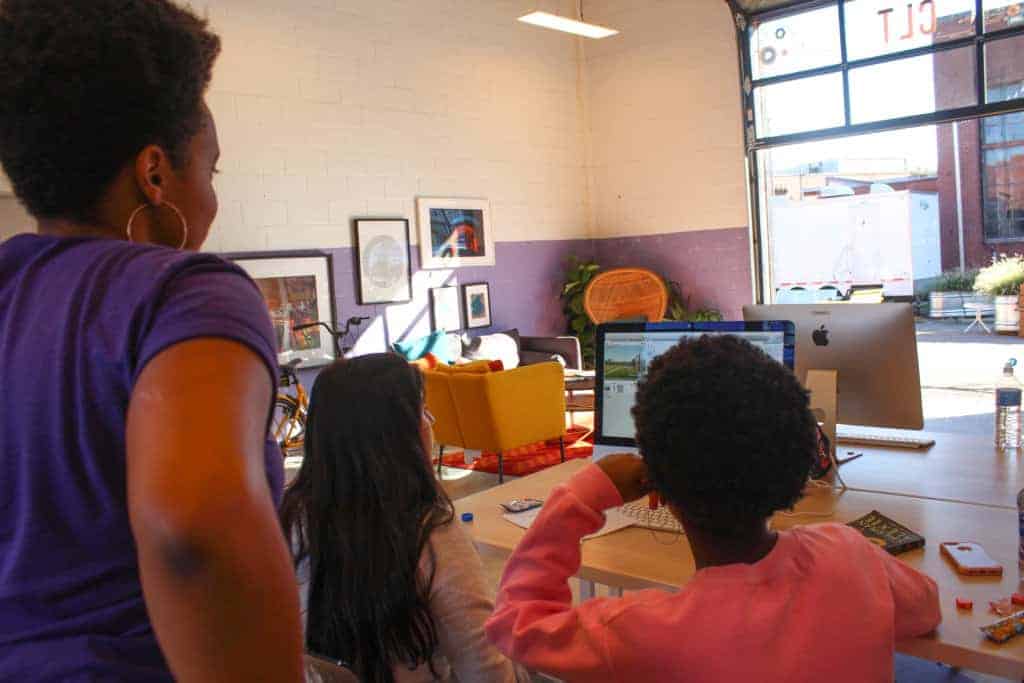

For Lead Tech Instructor Latori Miller, the mission is much more than just bringing minority girls into the tech industry. It’s about bringing in their ideas.
“I just want them to understand that their ideas are good,” said Miller. “You kind of have to build that confidence. I sometimes think girls don’t empower themselves enough to think that what they have come up with is enough.”
And the girls brought their ideas to their game. The one they were building wasn’t about taking down an enemy or scoring a goal.
“The topic of our app is equality,” ninth grader Amia Alyssa Ann Rice said. “We have three things in equality … sexism, racism, and educational equality. The goal is to teach people how to react not with always fighting somebody or always getting mad so easily. Basically, kill them with kindness.”
“We’re going to have questions at the bottom of the screen and we’ll have different answer choices, and they have to choose the positive one,” she explained.
This isn’t Rice’s first time at INTech. In previous camps, she learned to create websites in HTML and CSS. Last summer, she moved into Python, and each experience has inspired her to pursue a career in web design.
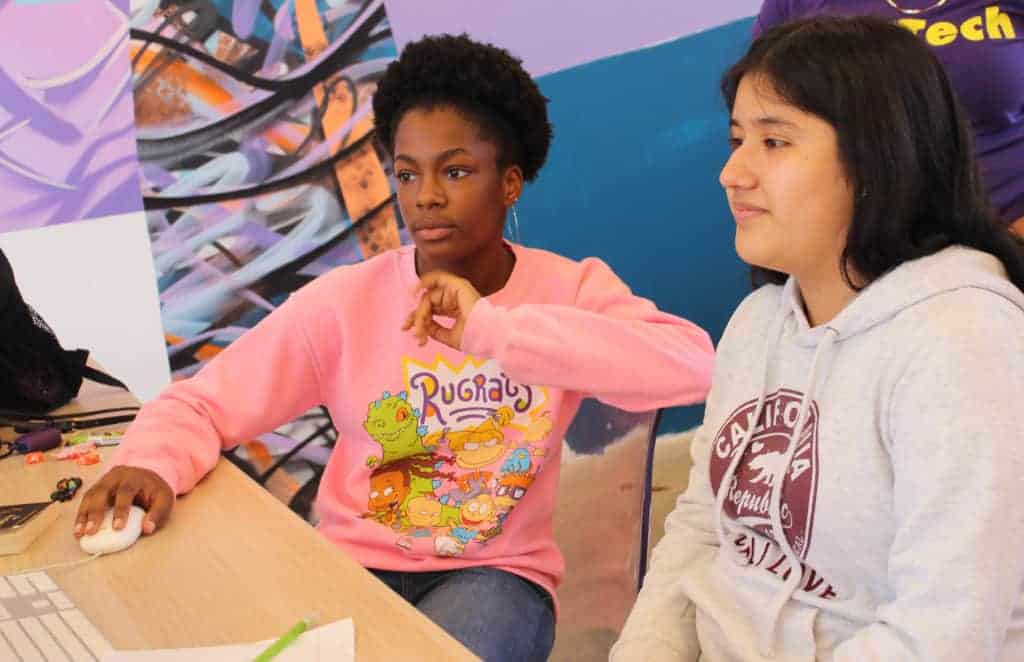

According to Braswell, it’s exposure to this technology that will really push minority women into the field.
“The schools just aren’t offering this, or they’re offering it and marketing it to the boys,” Braswell said. “So where do the girls have a safe place to actually learn this stuff?”
Without programs like INTech, the end results will continue to be bleak in terms of diversity in the tech industry. TechRepublic took a look at Apple’s diversity report from last year: “21% of Apple employees are Asian, 9% are black, 13% are Hispanic, and 3% are multiracial. Some 54% are white.” Meanwhile, women made up only “23% of workers in tech roles, and 32% of employees overall, according to Apple.”
And these low numbers of women have real-life professional impacts.
“Even when I started working in programming, I didn’t know how isolating it would be,” Miller said. “It was like walking into the room and the morning meeting is with fifteen guys and you’re the only female.”
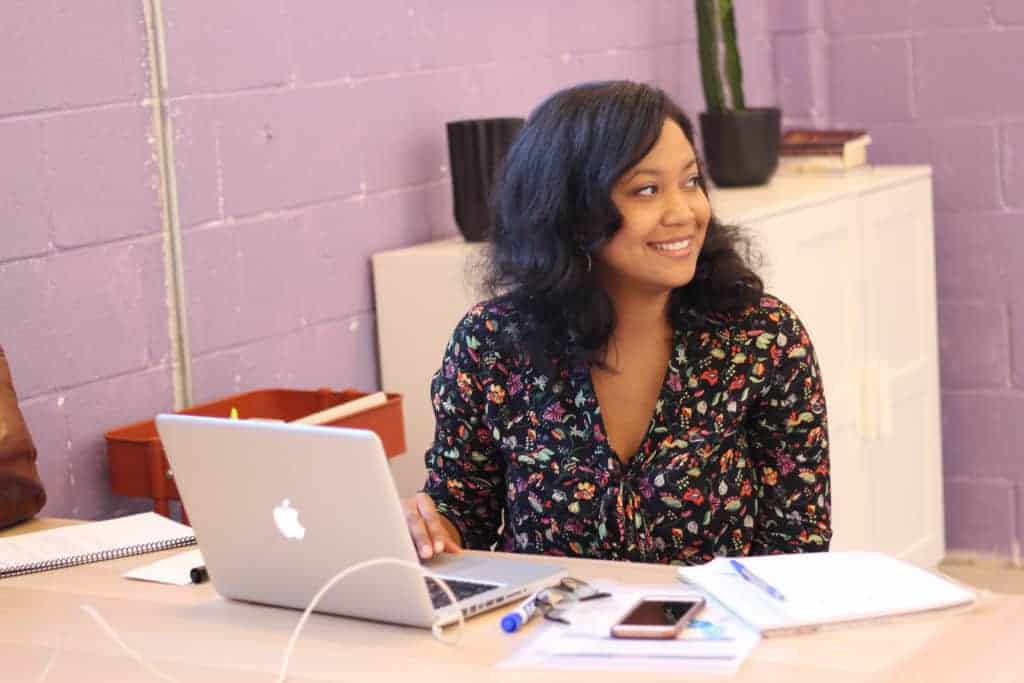

The experience of working in a male-dominated tech field is also why INTech is structured to put women tech leaders in front of the students.
“Although there is a shortage of women in tech, I know a lot of women in tech, so I try to put them in front of our girls as much as possible,” said Braswell. “I think a lot of this is the mentorship and confidence, because the skill you can learn anywhere.”
“That confidence part can keep you from doing a lot of things,” Braswell added. “You can get intimidated. There’s impostor syndrome, things of that sort. So I hope that we’re knocking down that part.”
With a focus on minority girls, though, Braswell knows she’s up against another intersectional set of challenges. A Wired piece notes that while there may be increased computer science offerings in K-12, “black and Hispanic students are less likely to have access to those resources. They’re also at a disadvantage outside of the classroom: Two-thirds of white students report using computers at home, whereas only half of black and Hispanic students do.”
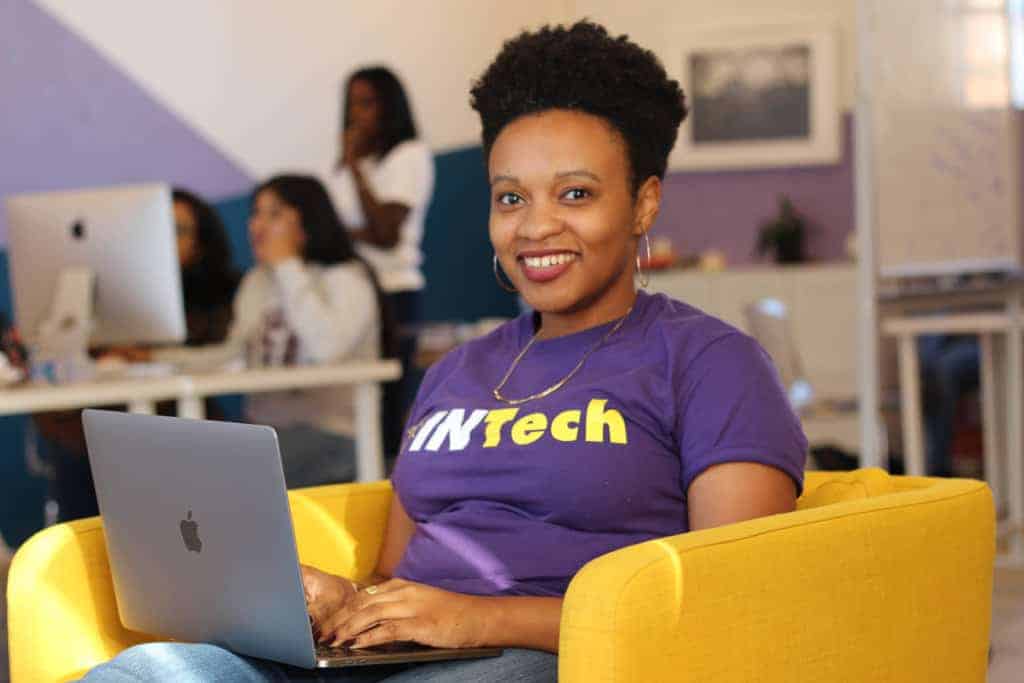

“I will say that because the need is great, I felt like I needed to give it 110 percent of my time,” said Braswell, who had originally founded INTech as a one-day camp in 2014 and who recently left a position with Apple in San Francisco to work on the nonprofit full time.
The need for diversity in tech isn’t lost on the camp’s scholars. “It’s such a field where there’s a lot of creativity involved and [it’s a] problem-solution type of field. That’s what technology is: to make stuff easier, more entertaining, better for humans,” said tenth grader Maria Morales-Salgado. “So if you’re only focused on one point of view …”
Morales-Salgado wants to become an engineer, and though she isn’t blind to the barriers of being a minority girl entering the field, she said for her it’s all about “not just holding back because people want you to hold back — accomplishing things that you want to do because it’s what you want to do.”
As Braswell expands her vision for INTech, she hopes to continue to pull minority girls into the fold — not only in metro areas like Charlotte and Raleigh, but areas like Rocky Mount as well — to create an internship pipeline and to develop the program so that eventually high school scholars are mentoring middle school scholars.


“They are so capable to do so many amazing things themselves through technology,” said Program Director Tarlon Khoubyari. And through INTech, it seems this thought process is becoming hard-wired in the upcoming generation.
“I want to prove people wrong — show them I can do it,” said Rice. “I’m a woman, and I can do it, too.”


